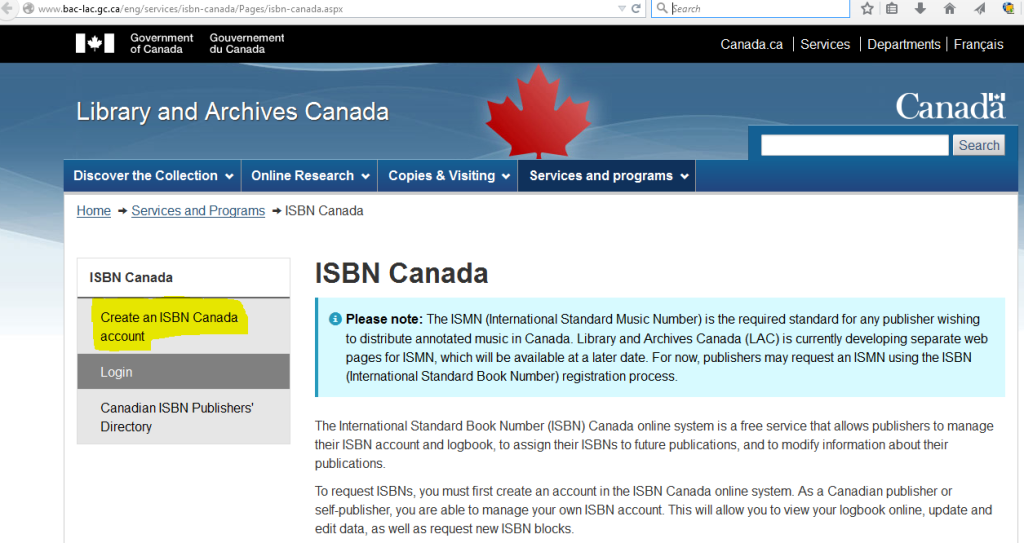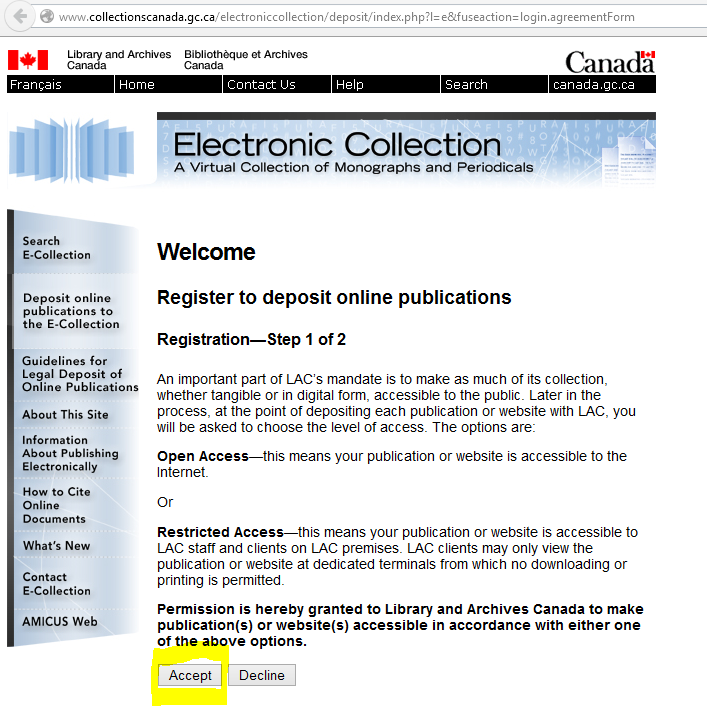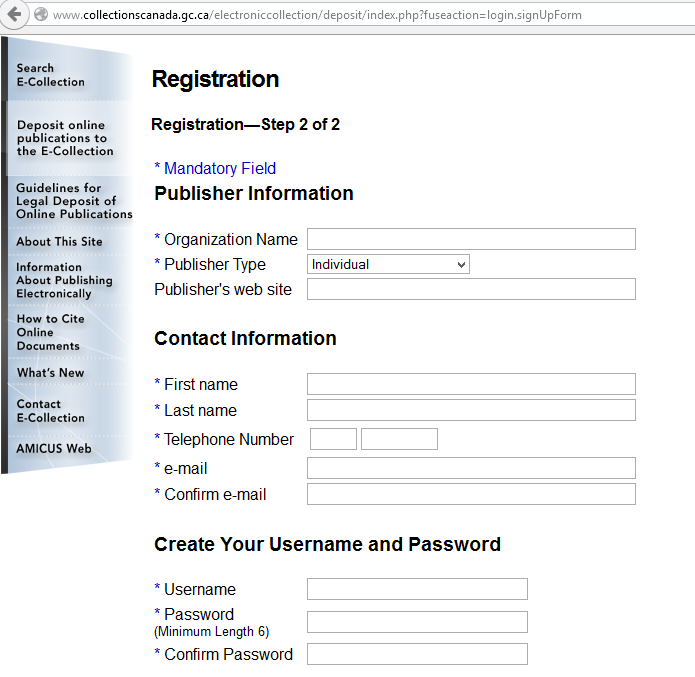 Since January 1, 2007, it is the law in Canada that all publications, with few exceptions, must be registered with Library and Archives Canada. Shame on me. I’m sorry. I didn’t know. And I’ll bet many other Canadian authors don’t know either. So let’s fix this so we’re all obeying the law and won’t have the Archive police chasing us.
Since January 1, 2007, it is the law in Canada that all publications, with few exceptions, must be registered with Library and Archives Canada. Shame on me. I’m sorry. I didn’t know. And I’ll bet many other Canadian authors don’t know either. So let’s fix this so we’re all obeying the law and won’t have the Archive police chasing us.
To be fair to myself, I did know my paper books needed to be sent to the Archives and had done that. What I didn’t understand was that they wanted all versions – not only the paper ones but the digital ones as well. I thought one print copy of each book was enough. It wasn’t.
They want a copy of every publication that has a separate ISBN number. ISBN numbers are free in Canada and can be obtained at ISBN Canada. In order to do that, you first need to create an account per the guidelines on the site:
To request ISBNs, you must first create an account in the ISBN Canada online system. As a Canadian publisher or self-publisher, you are able to manage your own ISBN account. This will allow you to view your logbook online, update and edit data, as well as request new ISBN blocks.
Then, once your book is published you need to register it with the Library and Archives Canada. Why? Their website explains:
Legal Deposit: Preserving and Providing Access to Canada’s Published Heritage
History of Legal Deposit
Legal deposit has been an effective means of collecting and preserving the country’s published heritage for over 450 years. The concept was established in 1537 with the Ordonnance de Montpellier, enacted by King Francis I to ensure the collection and preservation of documents published in France.
Legal deposit in Canada has been in effect since the National Library of Canada was created in 1953. Initially applied primarily to books, legal deposit was later expanded to include serial publications (1965), sound recordings (1969), multimedia kits (1978), microforms (1988), video recordings (1993), CD-ROMs (1995), and cartographic materials as well as online or digital publications (2007).
What happens once a book is registered with legal deposit?
Through legal deposit, all materials produced by Canadian publishers become part of Library and Archive Canada (LAC)’s collection and are available for public consultation and use.
Once a publication is received, a description acknowledging the contribution of the publisher is entered into LAC’s online catalogue, which can be accessed by all Canadians in the comfort of their home.
So, to submit a book, the first thing you need to do is to create an account. This takes you to a screen asking you to accept their terms. 
Once you hit “accept” it goes to a screen where you will be asked to register/set up your account. 
Then you go to a form where you can upload your digital publications. The form is straightforward and easy. It will ask you to upload the entire e-file of your book, the ISBN number, creator and what type of book it is (I chose monograph as each book stands alone, serial might fit for some of you). In the left hand blue column you can click on “Guidelines for Deposit of Online Publications” for more information.
I registered my first book and got an e-mail confirmation back within minutes. It’s easy as pie. When each screen is completed and you hit “send,” it will repeat the same screen and ask you to upload another selection until you have registered all your books.
But wait. As I read more closely I wonder if all this actually applied to me. I published with Createspace, KDP publishing and Smashwords. Here’s what I read on their website:
Publishers Affected by Legal Deposit
Legal deposit applies to all publishers in Canada.
A “publisher” is defined broadly in the Legal Deposit of Publications Regulations as: “a person who makes a publication available in Canada that the person is authorized to reproduce or over which the person controls the content. It does not include a person who only distributes a publication.”
Types of publishers include, for example:
- trade and small press publishers
- academic and educational publishers
- periodical publishers
- producers of music, video and spoken-word recordings
- publishers of multimedia, cartographic and microform materials
- federal government departments and agencies
- associations, organizations
- self-publishers
Note: Titles by Canadian authors published outside of Canada are not subject to legal deposit. If authors or publishers wish to donate copies of these publications to LAC’s collection, they are welcome to send them to the following address.
Gifts Section
Library and Archives Canada
395 Wellington Street
Ottawa ON
Canada
K1A 0N4
In the end, I was still somewhat confused. I published with U.S. companies, but I used Canadian ISBN numbers. So, I called their toll free number to find out. The answer is – if you use an ISBN obtained in Canada your work is deemed published in Canada. Therefore you must register all your books with Library and Archives Canada.
Good luck. Now, all you Canadian law-breakers, go register before the Archives police (haha) come after you with their big stick.
[Thanks to Lorraine Reguly for writing in about this. – The Admins]

Great information!
I wrote a similar post a while back about this very issue, but I don’t have nearly the amount of readers that IU does! LOL
Here’s the link to that post, if anyone is interested in it. It actually contains NEW information, recently updated when I learned:
It’s also the LAW for UK AUTHORS to submit their books, too.
The link to THAT post is at the beginning of this one:
http://lorrainereguly.com/legal-deposit/
Thanks, Lorraine. Your post was the inspiration for this one.
I wish we had the same system in the US! Free ISBNs! An cataloging number assigned without cost! Self-publishers treated like the big five! The True North strong and free indeed.
lol, go Canada.
Thanks for the information, Yvonne. Nice overview here. I’m registered on the site and got my free ISBNs from it, but missed that they wanted a hard copy of my paperback.
Glad to help fill in the blanks. I was the opposite – gave them paper but didn’t know they also wanted e-books.
It’s still cheaper to send LAC copies of every format of every book published than paying what some sources charge for ISBN numbers.
If you’re a prolific writer, you can set aside a large block of ISBNs. Then you don’t have to wait when you’re ready to assign a new one.
That may work for the U.S., Cathy. In Canada we can also ask for more than one, ahead of when we publish, and they come within days of the request – free.
This entire article is above my pay grade, but I sure learned a lot. Thank you, Yvonne!
Do we have to pay when we send our books? I haven’t yet published any of mine though I am getting much closer to doing the first one. It used to cost $10.00 to register an unpublished ms, then went up to around $30.00, but I don’t know what it is now or if you have to pay the same for a published book. I have been approved to get ISBNs, but haven’t yet followed through to actually get them.
The only charge is whatever it costs you to send the book to LAC. With e-books, that’s nada, zero, nothing.
Correct. Thanks, Kathy.
Not sure why the writer got ISBN numbers from Canada after publishing at CreateSpace, kdp and Smashwords. All of these offer free ISBN #s in the US, even though they are distributed in Canada, UK and other places.
Amazon offers ASIN’s and they remain with Amazon. The Canadian ISBN’s stay with the book, and so, the author. As well, my Canadian ISBN’s allow me to be recognised as a Canadian author, and to become a member of the Writers Union Of Canada. Canadians are more patriotic than many realise.
We have the same system in New Zealand. It is actually very helpful as it means our books are listed and seen on the list in libraries and schools.
Thank you. That’s good to know. I wonder how many other countries do that.
I’m a wee bit confused. I’m a Yank (i.e. American and not a Yankee’s fan–my baseball team’s the Red Sox) but most of my recent ebooks are released under the auspices of Carrick Publishing, which is Canadian. They all have ISBNs (I have a list somewhere–ASINs are usually more important to me). I don’t even register at the U.S. Library of Congress anymore. Do we have to register with this Archive?
I’ll forgive you for both of those.
Now that IS a good question – one to which I don’t have a good answer. I suspect the best way to find out is to contact your Canadian publisher – or phone the toll free number (1-866-299-1699 – I think this is the international one) If you get an answer soon we’d love to have you let us know, here.
That’s awesome!
I have to say, you did a fantastic job on the tutorial end of things, and I’ve added a link within my post to this one.
Thanks, Lorraine – but some thanks go to Kat Brooks – especially on the screen shots.
Yeah, Kat was the person I contacted to let her know about my post.
Kat’s great!